Team Taisan
Team Taisan (チーム・タイサン, stylized as Team TAISAN) is a Japanese auto racing team founded in 1983 by Yasutsune "Ricky" Chiba and owned by the Taisan Industrial Company.[1] Most active in the Super GT Series, formerly known as the All Japan Grand Touring Car Championship (JGTC), Taisan has been involved in all but one season from 1994 to 2018, taking a sabbatical in 2015. During that time they have won eight team championships and four drivers championships, representing manufacturers Ferrari, Porsche, Dodge, Toyota, Nissan, and Audi. Team Taisan has also participated in the 24 Hours of Le Mans, winning their class on their debut in 2000. For nearly their entire career, Taisan has been sponsored by tire manufacturer Yokohama Rubber Company, often carrying the name of Yokohama's Advan brand.
| Founded | October 1983 |
|---|---|
| Founder(s) | Yasutsune Chiba |
| Base | Fukushima Prefecture, Japan |
| Team principal(s) | Yasunori Chiba |
| Current series | Super GT Series, All Japan EV-GP Series |
| Former series | Fuji Long Distance Series, All-Japan Sports Prototype Championship, Japanese Touring Car Championship, Asian Le Mans Series |
| Current drivers | |
| Teams' Championships | JGTC GT500: 1995 JGTC/Super GT GT300: 1996, 1998, 2000–2003, 2012 GP-EV: 2011 ALMS LMGTE: 2013 |
| Drivers' Championships | JTCC JTC-2: 1989 JGTC/Super GT GT300: 1996, 1998, 2000, 2012 ALMS LMGTE: 2013 |
History
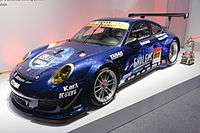
The team was initially formed through Nova Engineering and their efforts in the All Japan Endurance Championship and Fuji Long Distance Series. Taisan operated one of the teams' Porsche 962C with drivers Kunimitsu Takahashi and Kenji Takahashi. Kunimitsu went on to win the Endurance Championship three times from 1985–1987, while Nova Engineering won the team championships in the Fuji Long Distance Series those same years. Taisan expanded their program to include the Japanese Touring Car Championship in 1989 with BMW M3s, adding Briton Will Hoy to the team in 1990. A Group A category Nissan Skyline GT-R was added to the team in 1991 for Kenji Takahashi and Keiichi Tsuchiya while their BMWs continued in the lower JTC-2 category. Kunimitsu replaced Kenji in the Skyline for 1992 and 1993 before Kunimitsu and Tsuchiya left to form their own racing team and the JTCC eliminated the Group A cars from the series, leaving the team with a single Super Touring BMW for Kazuo Mogi in 1994.
Taisan returned to sports car racing in 1994 in the new All Japan Grand Touring Car Championship, the team participating with one of their former 962Cs and teamed alongside a Ferrari F40. Masahiko Kondo and Anthony Reid won one race for the Porsche while Tetsuya Ota and Oscar Larrauri earned one victory in the Ferrari. A switch to a pair of Porsche 911 GT2s earned three GT1 victories in 1995 and the teams championship for the GT1 category,[2] while the team also added a GT2 class campaign under the Team Taisan Jr. moniker for a Porsche 964. Taisan Jr. became a dominant team in the rechristened GT300 class, winning the drivers and teams championships in 1996, followed by second place in 1997 and another championship in 1998 while campaigning a new Toyota MR2 in cooperation with Tsuchiya Engineering.[2]
Taisan's success led to the team being invited to participate in the 24 Hours of Le Mans in 2000 for the LMGT category. Their Porsche 911 GT3-R, driven by Hideo Fukuyama, Atsushi Yogo, and Bruno Lambert won the category by a six-lap margin. Upon returning to Japan, Taisan began a streak of four consecutive GT300 team championships from 2000–2003, including a drivers championship with Fukuyama in 2000. Another Le Mans also earned the team a podium finish in their class for 2002.[2] Taisan downsized to a single Porsche team from 2004 onward as the JGTC transitioned to the new Super GT Series; Taisan eventually joined with Endless for a joint program that earned them another drivers and teams championships in 2012. The team expanded once again in 2013, retaining the Porsche in Super GT while joining the new Asian Le Mans Series with a Ferrari 458 Italia GT2, winning the series championship and earning the team an automatic invitation to Le Mans, their first since 2006.[2] A difficult 2014 season with a new Nissan GT-R led Taisan to take a sabbatical year from Super GT,[3] returning in 2016 with an Audi R8 LMS in cooperation with SARD.
Team Taisan also began to embrace electric motorsport by participating in the All Japan EV-GP Series in 2011 with Tesla Roadsters as well as a modified Porsche 914, winning the 2011 championship. The team also began developing electric karts.[4] In 2018 Chiba announced an auction of many former Taisan racing cars dating back to the early 1990s, including several JGTC and Super GT machines.[2] Chiba also announced at the conclusion of the 2018 Super GT season that the team would cease participation in Super GT, instead concentrating solely on electric motorsports.[5]
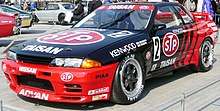 1991 Nissan Skyline GT-R Group A
1991 Nissan Skyline GT-R Group A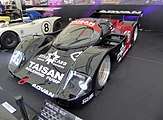 1994 Porsche 962C
1994 Porsche 962C 1994 Ferrari F40
1994 Ferrari F40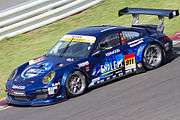 2012 Porsche 911 GT3 R
2012 Porsche 911 GT3 R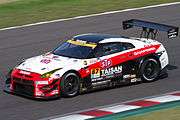 2014 Nissan GT-R GT3
2014 Nissan GT-R GT3.jpg) 2017 Audi R8 LMS
2017 Audi R8 LMS
References
| Wikimedia Commons has media related to Team Taisan. |
- "Team TAISAN". Super GT. Retrieved 8 November 2018.
- O'Connell, RJ (6 November 2018). "Team Taisan Set To Withdraw From Super GT". DailySportsCar. Retrieved 8 November 2018.
- "タイサン、2015年はSGT/ル・マンの活動を休止" [Taisan suspend SGT / Le Mans activities in 2015] (in Japanese). Auto Sport Web. 4 February 2015. Retrieved 8 November 2018.
- "Team TAISAN and Power Japan Plus Form Partnership to Develop World's First Electric Vehicle Powered by the Ryden Dual Carbon Battery". Business Wire. 16 June 2014. Retrieved 8 November 2018.
- Hirano, Ryuji (7 December 2018). "チーム・タイサン、2018年限りでスーパーGTでの活動に幕。今後はEVレースへ転換" [Team Taisan ends activities in Super GT in 2018, now turns to EV racing]. Autosport Web. Retrieved 28 December 2018.